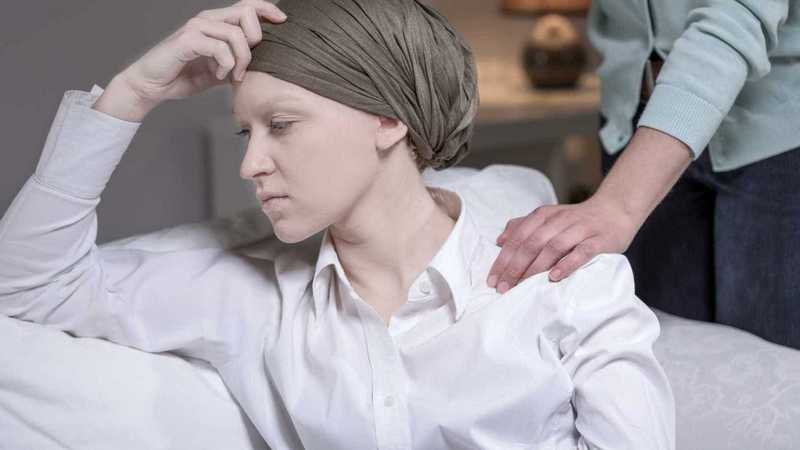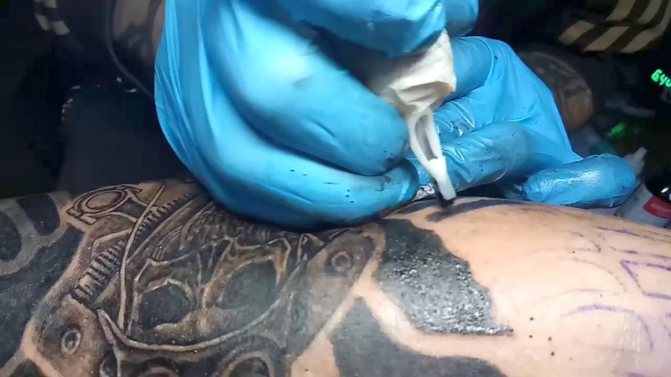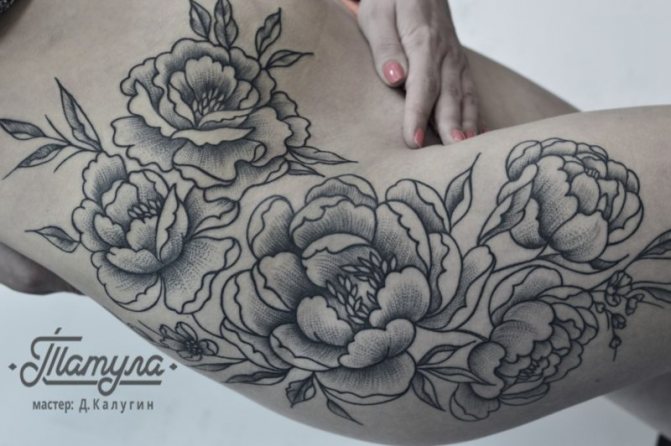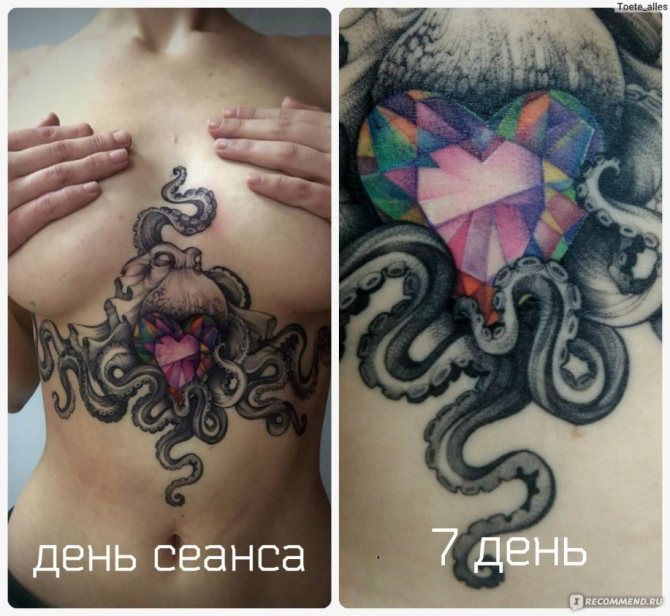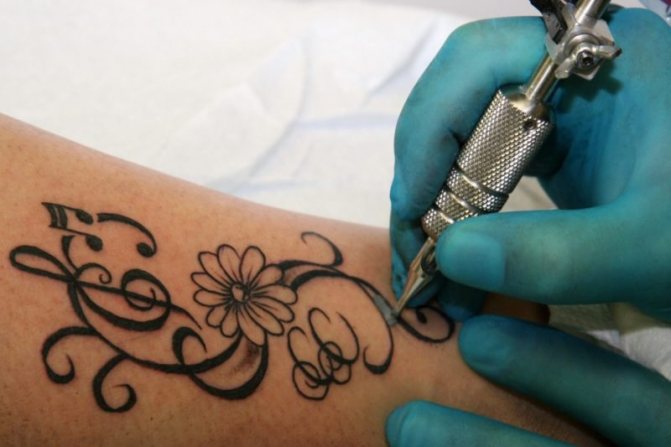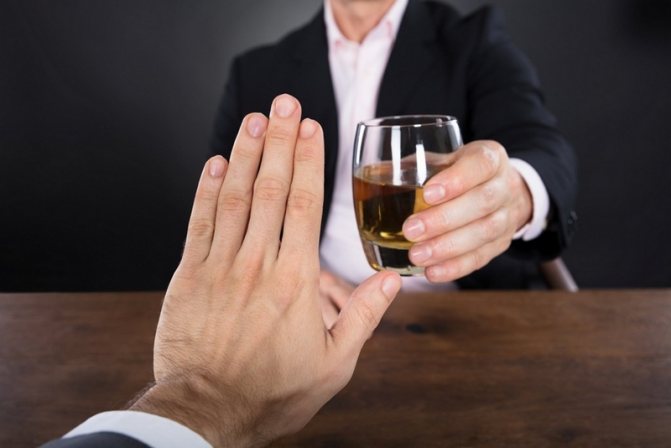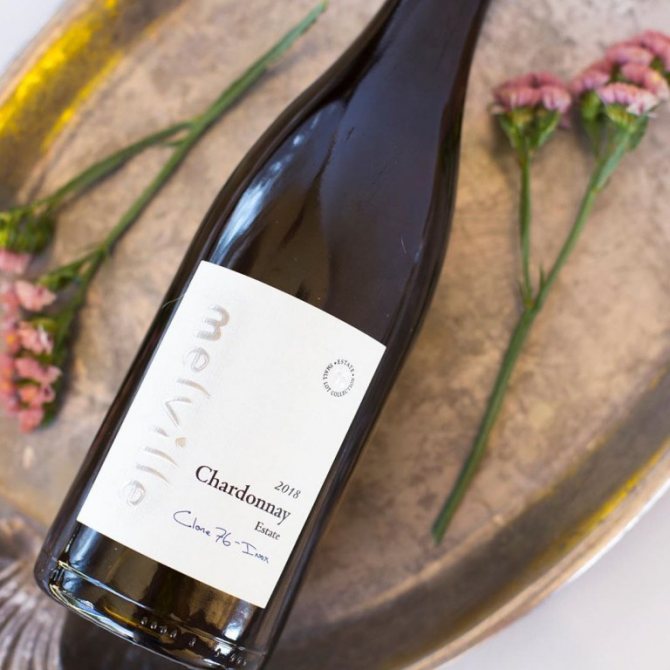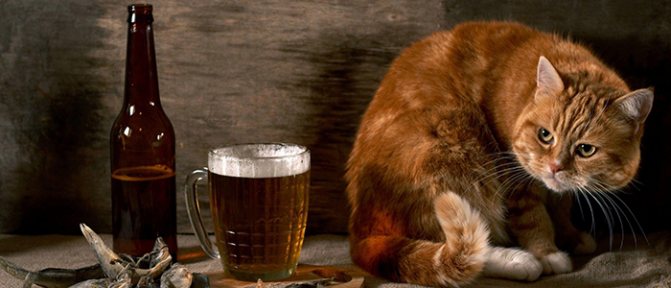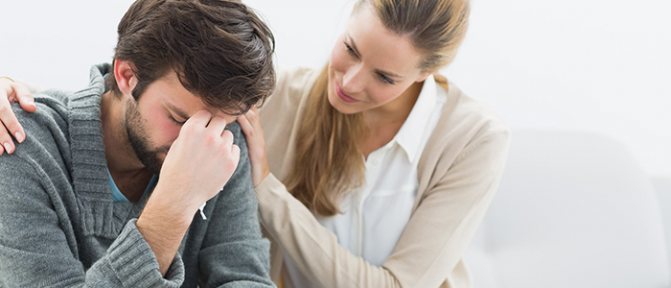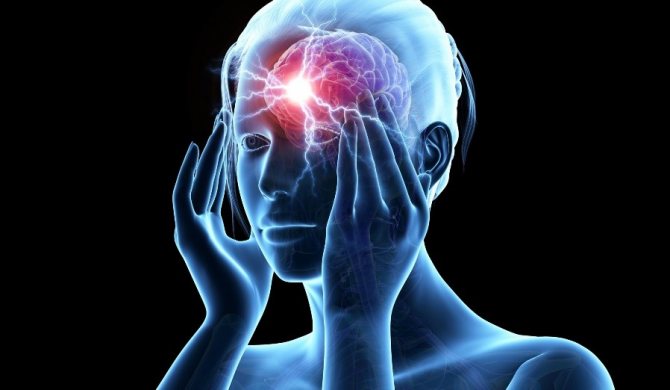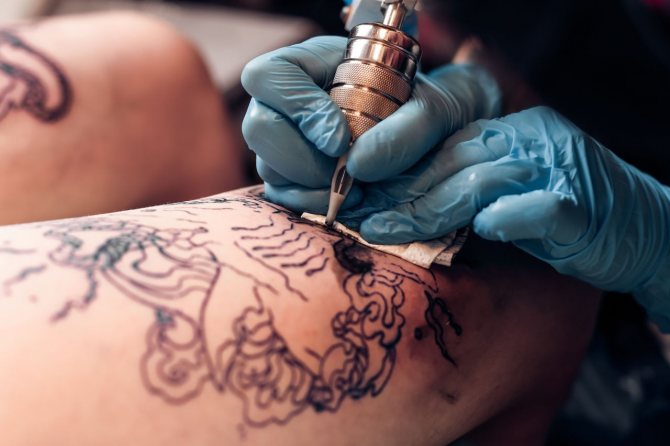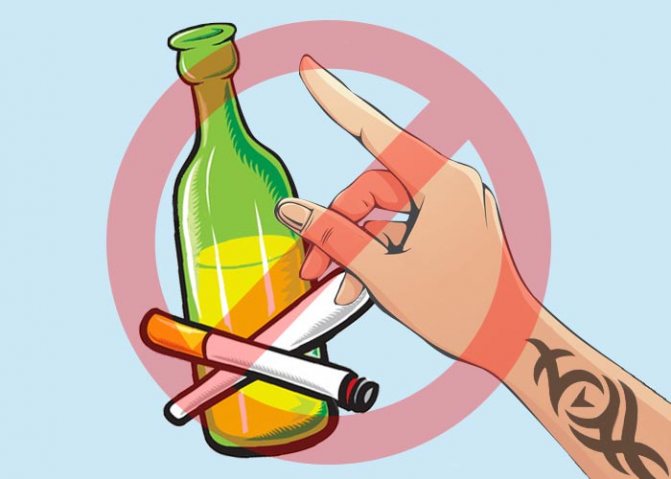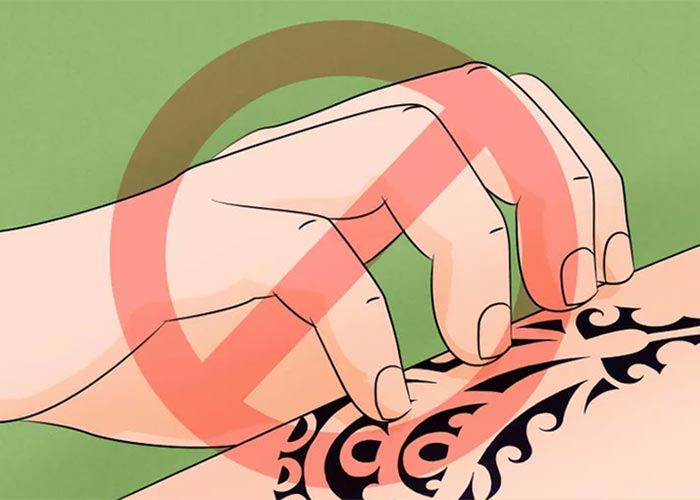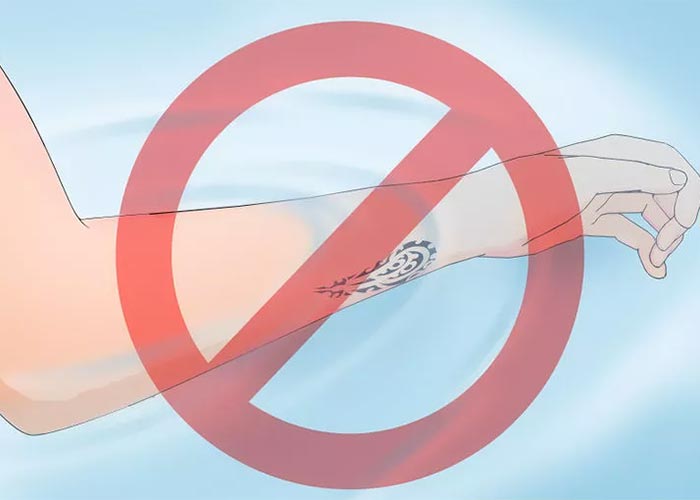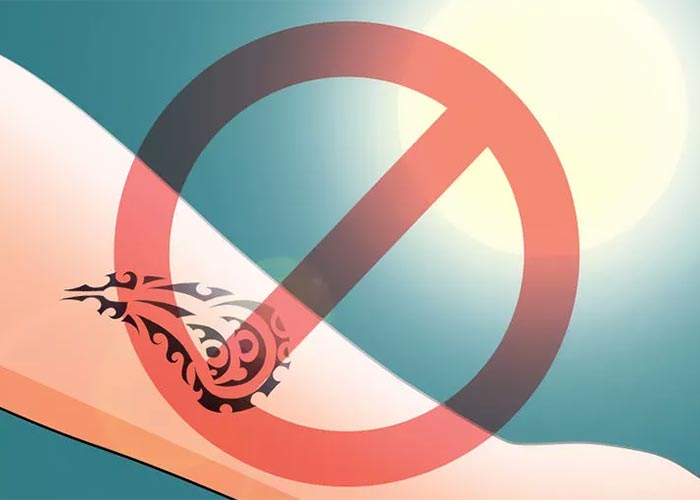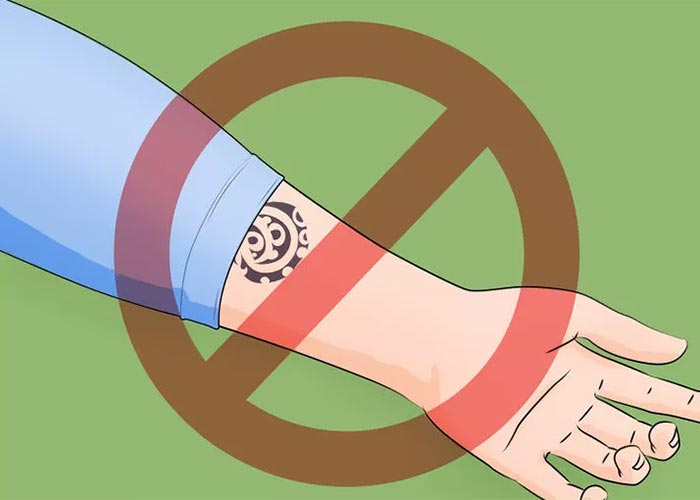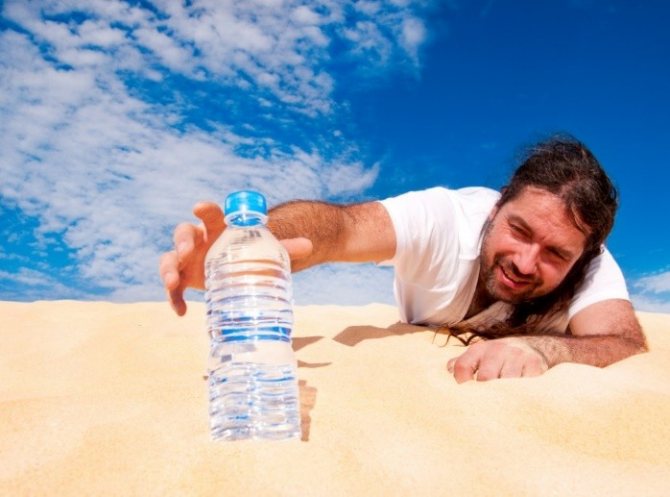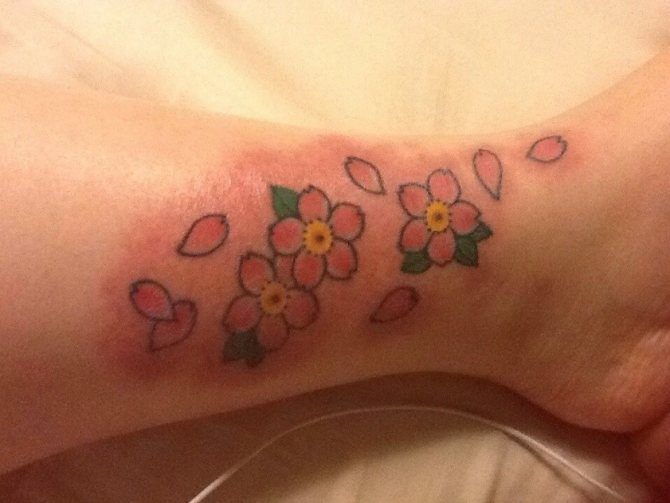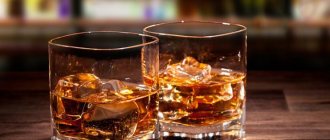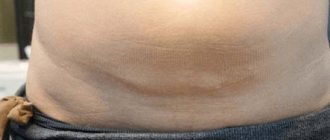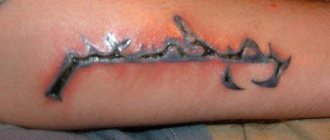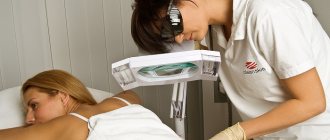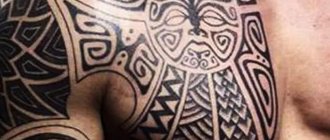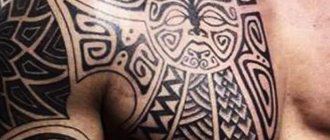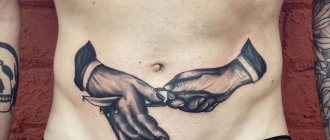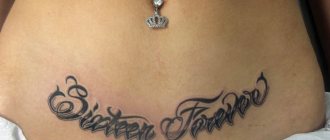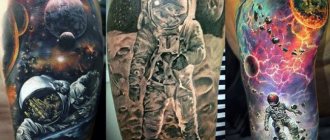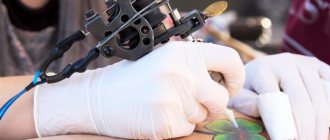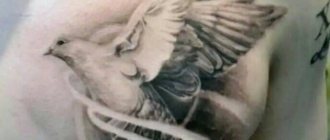The decision to put a drawing on the body is taken in different states. No salon will not allow a client in alcohol intoxication. A competent tattoo artist will quickly answer the question of Is it possible to drink alcohol after the tattoo And before its application.
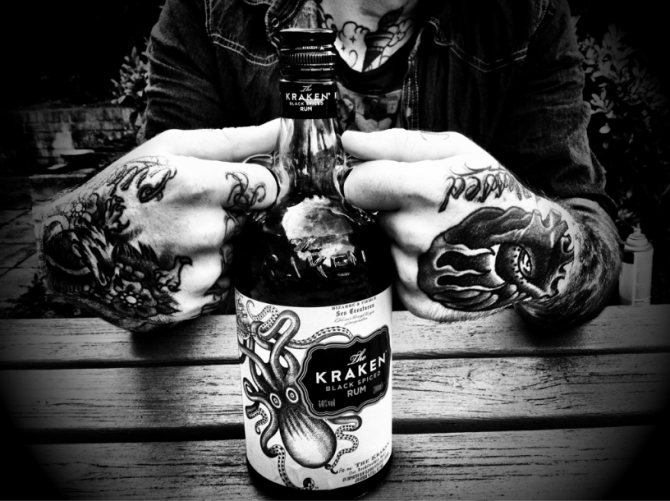
Tattooing is a uncomfortable procedure, sometimes accompanied by pain. As a consequence, people wish to relieve the pain with alcohol.
TIME FOR TATTING
Tattoo parlors work all year round, but summer is considered the worst time for tattooing. Heat, excessive sweating, dust - even if you carefully monitor your hygiene, all these factors slow down the healing of the design.
In addition, a fresh tattoo will have to be hidden from the sunlight. Until it is completely healed, it is strictly forbidden to sunbathe or bathe in the sea. Open reservoirs and swimming pools are not suitable either. The fact is that in the first days after the session, the picture is an open wound, from which lymph is released. It is enough to bathe once to get an infection.
What is good about late autumn? At the very least, you don't have to sacrifice meaningful rest. You can safely beat a complicated tattoo that requires several approaches. For example, working on a sleeve can take anywhere from 2 to 6 months.
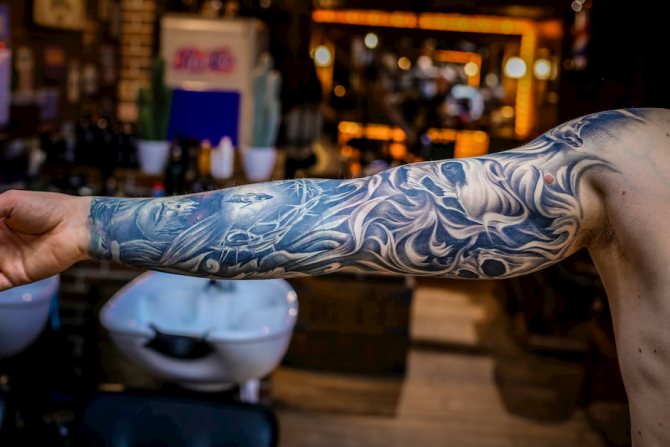

Usually the interval between approaches is 2-4 weeks
There are a number of restrictions that will have to be observed at any time of the year. First, during the healing of the tattoo it is impossible to visit bathhouses and saunas. Secondly, you will have to limit sporting activities, and take a shower instead of a bath.
Oncology and alcohol - compatibility
These are two opposing concepts, so there is no compatibility whatsoever. We cannot say that it is ethanol that causes cancer, but it creates the optimal conditions for its occurrence. The way this happens is as follows:
- In the process of deactivating ethanol. an intermediate product of decomposition, acetaldehyde, is formed in the human body.. This is a toxin, a carcinogen, which leads to mutation of cellular proteins.

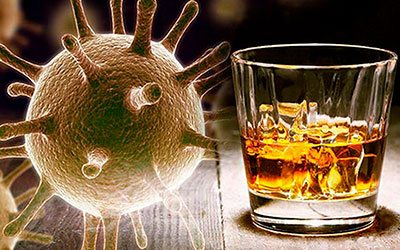
- Ethanol metabolites cause serious damage to the liver .. The cells of the organ begin to enlarge in size. A pronounced inflammatory process is observed. As a consequence, the liver ceases to cope with its functions.
- When ethanol is broken down, reactive oxygen species are produced. They oxidize proteins, fats. The latter are gradually destroyed.
- Alcohol-containing compounds prevent the body from absorbing many useful compounds from the food it eatsincluding vitamins and minerals. This is why almost all alcohol addicts are diagnosed with avitaminosis. With a deficiency of natural antioxidants - vitamins C, E, A - the body loses the ability to resist harmful free radicals. This is another reason why doctors, telling whether you can drink alcohol with cancer, answer in the negative.
- Ethanol increases the production of the female sex hormone, estrogen. Its excess is associated with breast cancer in women and prostate cancer in men.
- Alcoholism does not absorb folic acid. Without it, it is impossible to form healthy DNA.
All these facts allow us to say that alcohol is a friend of cancer. That is why you can not drink alcohol after cancer, it is forbidden even during it. People who continue to use "hot drinks" while fighting a deadly disease make themselves worse.
THE CHOICE OF ESCAPE
Let's not engage in moralizing, let's just remind that a tattoo is for life. Sure, you can get a bad design reduced or overlapped, but why make it harder?
Most tattoo parlors have free consultations. You can discuss with the master the style of the future tattoo, the choice of colors or advice about the location of the image. You will also be advised on the cost and duration of the session. A standard session lasts 4 hours, but much depends on the size and location of the tattoo, as well as your skin type and pain threshold.
Many tattoo artists work with one or more styles. Not every artist who beats old-school or new-school tattoos will be able to do a realistic design, and vice versa. Before you ask for a sketch, look at a portfolio. In a perfect picture of the world, a professional won't take on a job if he's not confident in his abilities, but in life it's different.
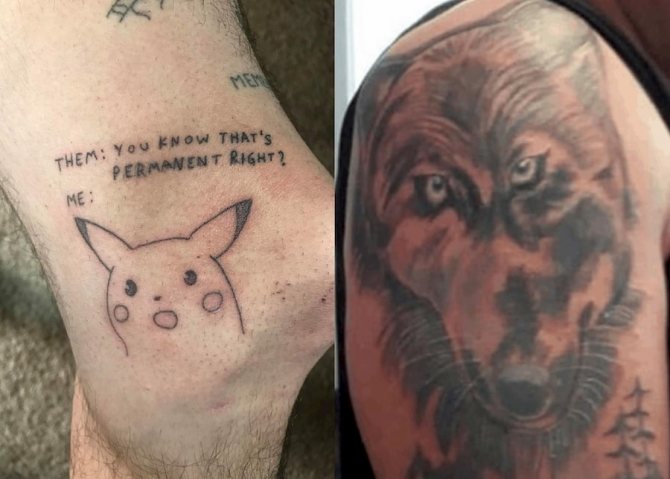

Handpoke Pikachu doesn't look like a partak and looks quite nice. But a "realistic" style wolf can scare children (photos: pinterest.com, rocketgeeks.com)
OldBoy Barbershop has its own database of designs and fonts. You can choose a ready-made design or order a custom sketch. Usually, craftsmen don't like to be asked to copy someone else's work. Nevertheless, photos of existing works, pictures and any visual examples will help in creating a sketch.
Is it possible to drink alcohol before the tattoo?
The unequivocal answer is that strong drinks before and after the tattoo are strictly not recommended. The prohibition is explained by medical factors. However, you should not forget about the symptoms of natural intoxication:
- The specific reaction of a person to external events;
- increased irritation;
- making rash decisions;
- difficulties in conducting a dialogue.
Masters perceive a drunken person who has come to a session as a manifestation of disrespect. After drinking, the client chooses strange sketches, which he will regret drawing after sobering up. Pain threshold is a personal parameter of each person. It is not a fact that alcohol will reduce pain sensations.
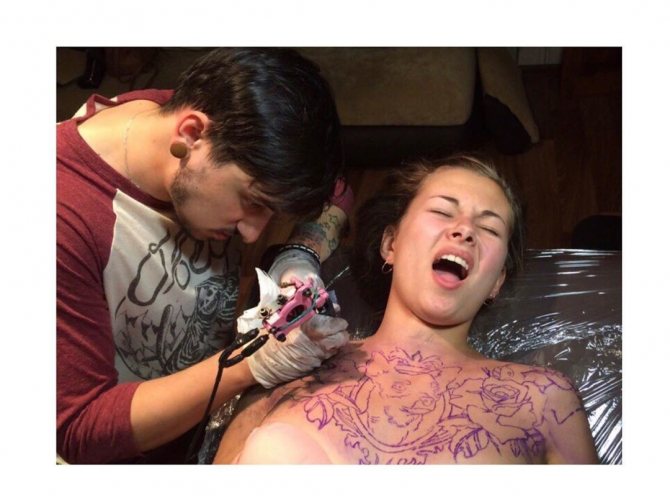

The deplorable consequence of the combination of intoxication and tattooing is a voluminous surface of the skin, which does not stop bleeding. The chances of secondary infections joining increase. Infections provoke sepsis.
SAFE SALON
The main advantage of tattoo salons over the masters who take at home (yes, they still remain) - safety and sterility. Times of "Ringman, nakolili me dome" long gone. Modern equipment, quality pigments and disposable supplies are all included in the service by default.
In the COVID-19 pandemic it is especially important that the tattoo parlor is regularly disinfected rooms, and the masters wear personal protective equipment. Whether you believe in coronavirus or not, hardly anyone wants to come down with an infection after a session. We care about the health of our employees and customers, so OldBoy Barbershop strictly adheres to all sanitary regulations. Our masters wash and treat their hands before each session, and you can do it an unlimited number of times. Don't forget to take a mask with you.
Breast Cancer from Drunkenness
Statistically, about 25 percent of women facing a breast tumor are alcohol dependent. The significance of alcohol in relation to the development of cancer is dose-dependent. Thus, if a patient uses one small dose of alcohol every day, her chance of facing a tumor increases by 20%; if she is often drunk, her chances of becoming a cancer patient increase by more than 50%.
Foreign researchers have found that if a girl drinks 4 glasses of wine every day, her risk of becoming a cancer patient increases by 1.5 times, if she drinks 8 glasses, then by 2.3 times. All because because of regular drinking there is a sharp jump in the level of estrogen in the female body.
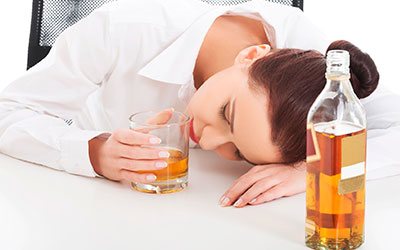

PREPARATION FOR THE SESSION
Men's tattoos on the chest and neck are not only beautiful, but also painful. Yes, and the application of any drawing on the body with a needle often causes unpleasant feelings. To make your session comfortable (as much as possible), prepare in advance:
- Get a good night's rest and a good night's sleep. Tattooing is stressful for the body, and it's harder to endure pain when you're tired.
- Be sure to take a shower before leaving the house. If the place of the future tattoo hair grows, gently shave them with a machine.
- Carefully choose your clothing. You should not wear a tight shirt if you are going to do the sleeve. Things should be comfortable. It is better to go in something you don't feel sorry for: ink that might accidentally get on your clothes cannot be washed off.
- It is strictly forbidden to drink alcohol at least one day before the session. It thins the blood, and this can lead to increased bleeding. The same goes for pain medications like aspirin. If you don't feel well or realize you are sick, postpone your session.
- Have a snack before your session, especially if you know the work will be long. But you should give up coffee and energy drinks. If you are an avid coffee drinker, reduce the number of cups a few days before your visit to the tattoo parlor.
The practical aspect
Besides causing health problems, alcohol after tattoo is able to bring all efforts of a talented artist and suffering of a patient client to naught. It will not help and "lowering the degree" - selected as an alternative beer slows down metabolic processes and provokes an excessive allocation of sukruta. This lymphatic fluid is designed to protect the body from any toxic substances and whatever it "seems" to be a threat: as a result, the paint injected under the skin will be attacked. The image will begin to fade and blur, not having time to please its owner with a riot of colors and clarity of outlines.
Indulgence of drinking after the procedure can bring results that will not please anybody:
- blurred borders of the design;
- A deterioration in the readability of the ornamentation or typeface;
- Loss of brightness of color.
To eliminate these undesirable effects you will have to make adjustments to the image, and that is a new uncomfortable experience, financial expenses, the need to go back to wearing clothes with long sleeves. Another option, which is unlikely to suit perfectionists, is to put up with the imperfection of his image.
TATTOO CARE
As we said above, a tattoo is an open wound until it heals, and it needs care. It usually heals completely in 5-12 days after the session. On average, it takes 7-10 days.
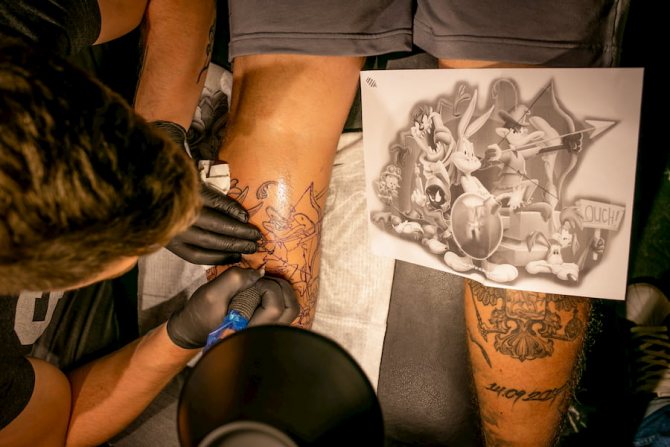

Special products like antiseptic are already applied during the session.
A good master will not let the client go until he explains how to take care of the tattoo. Try to follow his recommendations. Most likely the first advice will be about the absorbent diaper, which is put on after the session. It should be removed in 2-4 hours. A special healing diaper can be worn for several days.
After you have removed the first "compress", wash the tattoo site with warm water and antibacterial soap. Gently blot the clean skin with a paper or cotton towel. Then apply a healing agent, such as dexpanthenol-based ointment, and cover the tattoo with a new diaper. Repeat this procedure every 6 hours for 2-4 days.
At home, it is enough to make a compress only before going to bed. Open the skin to let it breathe
At first the wound may bleed. In 12-48 hours after the session, the tattoo will stop bleeding, but much depends on the body and the place of the drawing. Refrain from alcohol until the bleeding is gone.
During the next stage of healing (4 days or more), you may notice that the skin has become dry. This is how your body reacts to the pigment. Don't forget to use moisturizers.
If the blood continues to flow and the tattoo site is swollen and red, it may indicate an infection. See a doctor right away!
Lack of care can cause a crust to form. If you try to remove it, there is a risk of scarring. Do not touch or scratch the crust, it will gradually go away.
You will know that the skin has fully recovered when it is the same texture - both on the tattoo and on the "clean" areas. As a rule, it takes 1-2 months.
Consequences of drinking alcohol after a tattoo
If you ignore the recommendations voiced by the master to drink alcohol before or after the session, you should be ready for complications. Most often drinking alcohol before or after a tattoo session leads to the following consequences:
- uneven distribution of paint - occurs because of the mixing of blood and pigment dye. This defect can be eliminated only with the help of correction;
- The appearance of abnormal shades in the picturewhich spoils the whole picture;
- abnormal healing of the skin. If tissue repair is delayed, the crust on the wounds will appear too late, which can cause most of the pigment to come out, and gaps will appear in the picture.
Often it happens that the negative effects do not appear separately, but all at once. Often they require laser removal of the pigment followed by re-painting.
Tricyclic antidepressant drugs
The structure of such drugs is similar: 3 linked ring-shaped molecules. This list includes drugs that have in their composition the following active ingredients:
- Amitriptyline;
- Clomipramine;
- Imipramine;
- Tianeptine;
- Pipofezine.
These medications are highly toxic, so drinking alcohol while taking them is prohibited. Tricyclic drugs have many severe side effects, and as a result, the presence of alcohol in the blood increases the risk of their occurrence or intensifies their effects.
Tricyclic medications are not compatible with alcohol, other medications, or certain foods.
Possible side effects include side effects reactions include the following.
- Problems with the digestive tract (constipation, urinary retention). A state of drowsiness, frequent heart palpitations. Confusion of thoughts and consciousness may be recorded.
- A person becomes overweight, his blood pressure lowers.
- He loses his appetite and feels nauseous.
- Ejaculation and erections become worse.
- Convulsive seizures occur.
- Psychopathological symptoms worsen.
- Hypotension is observed.
Why you shouldn't drink if you have cancer
A spike in blood sugar levels, increased intoxication, dehydration, changes in metabolism, the release of large amounts of carcinogens - all these are prerequisites for the growth of cancer. And they arise precisely because of regular drinking.
If a person has already been diagnosed with cancer, he must set himself up for healing. And a binge lifestyle won't help in any way. Ethyl alcohol damages even young, healthy people. For cancer patients it is a deadly poison.. Don't let it ruin your health.
Why help is needed
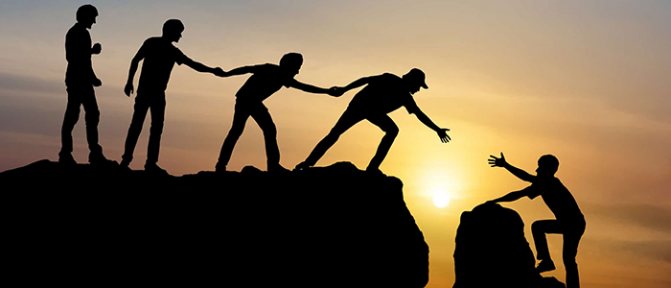

Some people, for objective reasons, cannot completely stop drinking right away. It is not necessary to categorically insist on giving up. To begin with, you should try to correct the stereotype of alcohol consumption. This will give an opportunity to slow down the development of addiction and take control over it. The consequence will be a decrease of the negative influence of alcohol on the organism, normalization of family relations (not always, of course, but nevertheless), and an increase of general capacity for work. 90% of people who drink and have problems with alcohol do not want to be treated for alcoholism for one simple reason: to agree to it means to admit that you are an alcoholic! Another stopping factor is the inability to drink at least periodically. With an addiction already formed, the likelihood of relapse is very high. However during the period of limited alcohol consumption you already form a trusting relationship with the doctor who helped you to reduce the amount you drink and establish control over your drinking. This increases the possibility of further persuading the patient to give up alcohol completely. Close contact between doctor and patient, talking about the problem leads to the formation of the patient's understanding of the problem. The process of forming an understanding is lengthy in time and cannot be created overnight. Gradually, the patient comes to the conclusion that alcohol must be given up completely.
Not drinking or drinking in moderation - who decides?
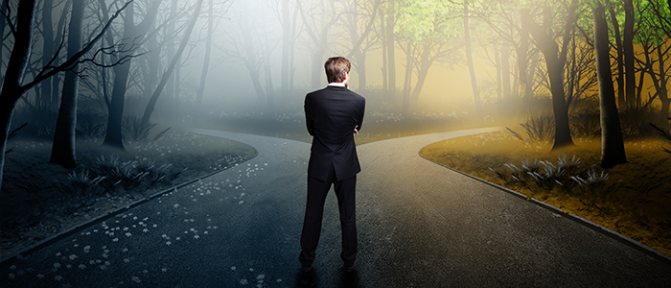

The person must decide for him or herself whether to stop drinking alcohol completely or learn to drink in moderation. The doctor's job is to gradually shift the focus from partial to total abstinence. Working with such a patient, a doctor can change his attitude towards alcohol, change his behavioral habits and make him look at the problem critically. All this leads to the fact that sooner or later the drinker will decide to give up alcohol completely. The more effective the help is, the earlier it is started. Raising a person's awareness of the negative effects of alcohol on the body, explaining to him the mechanisms of addiction formation, it is possible to develop in him a rejection of alcohol consumption. This is more of a psychological and pedagogical work than a medical one. In any case, if a person drinks alcohol, it is wrong to let him drink alcohol on his own. But it is not possible to force a person to drink either. Each case should be considered individually.
Who should not drink even in moderation.
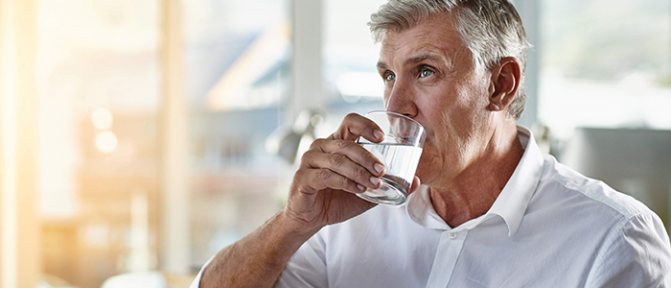

One category of people cannot be taught to control the amount they drink. They are those who have only one interest in life - to get drunk for no reason. Such people have no need in limiting the amount drunk. Only categorical refusal of alcohol is considered for them. The decision to refuse or to reduce the amount they drink should be made by the person. If you are concerned about your relationship with alcohol and feel like you are losing control over how much you drink, you should consider a moderate drinking program.
In order to use it effectively, you need to learn a few things: - how to set limits on your drinking; - how to control yourself in abusive situations; - how to deal with stressful situations; - how to deal with the problems that cause you to drink alcohol.


Whether you choose to stop or limit your alcohol consumption, you need to understand one thing: there is no going back to your old life. In either case, there will be a change in behavior patterns, you will have to make serious efforts to normalize your life; you will have to learn to manage your desires, your behavior. Many people who quit drinking for good have tried to limit their alcohol consumption on their own. But independent attempts in most cases ended in failure. A moderate drinking program is more effective, allowing you to really limit the amount you drink and then helping you to stop abusing it altogether.
MAO inhibitors
MAO inhibitors are active substances that slow down the enzyme monoamine oxidase. Such drugs include those that include such active ingredients as pirlindole and moclobemide.
When taking these inhibitors you should not Drinking alcohol when taking these inhibitors can lead to serotonin and tyramine syndrome. Taking antidepressants and alcohol leads to suppression of the respiratory center, so it is life-threatening. Careful diet is necessary, as there are many drugs and foods that are incompatible with MAO inhibitors.
Probable adverse reactions include:
- Accelerated adrenaline production and increased adrenaline levels;
- neutralization of the effects of an antidepressant drug when drinking alcohol;
- hypertensive attacks;
- more frequent heartbeat.
When taking MAO inhibitors, non-alcoholic beer is also prohibited. Beer has a lot of tyramine, a substance that increases adrenaline levels. When combined with antidepressant medication it can lead to terrible consequences for the person.
It is forbidden to drink even half a glass of dry wine.
Cancerous damage to the prostate
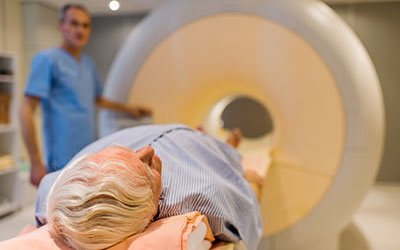

The prostate gland is affected by drinking in about the same way as the mammary gland. This is because alcoholic formulations increase the production of estrogens. An excess of these hormones disrupts a man's hormonal background and causes prostate damage.
Adenoma is very common in alcohol addicts. It is a benign neoplasm. But if you continue to lead an immoral life and do not start treatment of prostatitis in time, very soon you can face a malignant tumor.
Stomach cancer and drinking
When we are talking about cancerous lesions of the gastrointestinal organs, no one says that it is possible to drink alcohol when having cancer. It is clear to everyone without doctors that "hot" will aggravate the course of the disease. And this is really the case.
Ethanol strongly irritates the mucous membranes, the intestines, the stomach. It impairs the function of the liver. As a result. toxins are no longer eliminated from the body quickly and inflammation occurs rapidly. These reactions are ideal for the accelerated growth of abnormal cells.
Kidney cancer
Taking a "hot" drink three times a week or more often significantly increases the risk of getting sick. This is not surprising - the kidneys filter ethanol. They have to work harder and longer if a person drinks a lot. People over the age of sixty are especially at risk.
The following symptoms can make you suspect something is wrong:
- A feeling of rubbery urination;
- Blood in the urine;
- Too frequent urge to urinate;
- Lower abdominal pain.
If these signs appear, it means that the kidneys are working at the limit of their abilities, the likelihood of a tumor is very high, or it has already formed. The patient should take control of himself, stop drinking and see a nephrologist.
Can alcohol with herbal antidepressants
Light antidepressant drugs of plant origin are known to have a mild soothing effects. If a specialist has prescribed a person to take a course with such drugs, the reception of alcoholic beverages in this situation is not prohibited. However, it is necessary to drink it in small doses, so that a hangover does not occur.
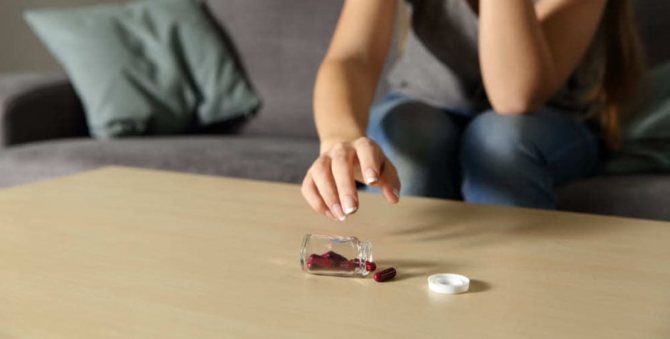

The minimum break between drinking alcohol should be 7 days.
Thus, it is necessary to read carefully the instructions for the drugs prescribed by the doctor. If the section "Pharmacological group" indicates "Antidepressant", it means that it is forbidden to drink alcohol during cura.
